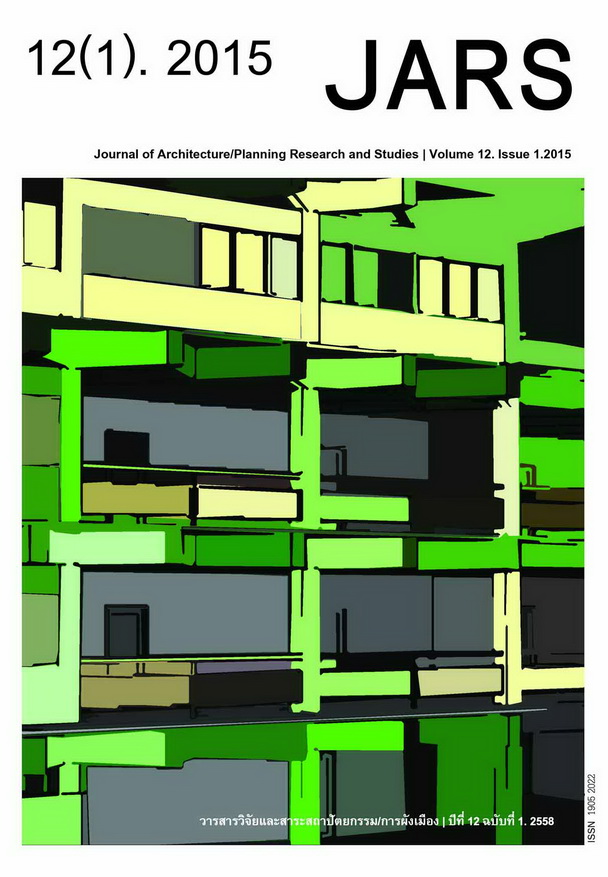A Study of Electricity Utilization in Beach Resort Hotel, Chonburi Province for Energy Conservation
Main Article Content
Abstract
This research investigated the standard electricity utilization in beach resort hotels based on a survey of four 4-star beach resort hotels in Chonburi, Thailand conducted in 2014. The main objective of the project was to know proportion of electricity in end-use category. Each hotel has total usable areas of 34,878.50, 24,706.56, 17,533.40 and 10,910.56 m2 with total air-conditioned areas of 17,364.45, 8,327.48, 5368.35 and 8,212.56 m2 respectively. The results showed that the hotel with most usable areas, air-conditioned space and using central air conditioning system has the minimum index value of electricity utilization for air conditioning system by compared with electrical consumption for air conditioning system per air-conditioned area equal to 72.36 kWh/m2/year. Unlike other three hotels with using split type air conditioning system that have this value equal to 89.92, 103.67 and 136.21 kWh/m2/year. Every hotel has the lowest proportion of electricity in lighting system compared with electrical consumption of air conditioning system and electric-mechanical system, which accounted for 5 – 10% of total electricity utilization and the maximum value of lighting density power is lower than 12 W/m2, which is considered the standard of Thailand Energy Conservation Promotion Act. Moreover, the study also found that the hotel with usable area most has annual electricity consumption for electric-mechanical equipment system that most in refrigerators, followed by pumps and other kitchen equipment, respectively which accounted for 53% of total electricity utilization. Finally, the results can also use as guidelines for designing beach resort hotels, Chonburi province for energy conservation, including the use of air conditioning systems appropriately.
Downloads
Article Details

This work is licensed under a Creative Commons Attribution-NonCommercial-NoDerivatives 4.0 International License.
All material is licensed under the terms of the Creative Commons Attribution 4.0 International (CC-BY-NC-ND 4.0) License, unless otherwise stated. As such, authors are free to share, copy, and redistribute the material in any medium or format. The authors must give appropriate credit, provide a link to the license, and indicate if changes were made. The authors may do so in any reasonable manner, but not in any way that suggests the licensor endorses you or your use. The authors may not use the material for commercial purposes. If the authors remix, transform, or build upon the material, they may not distribute the modified material, unless permission is obtained from JARS. Final, accepted versions of the paper may be posted on third party repositories, provided appropriate acknowledgement to the original source is clearly noted.
References
Commonwealth of Australia. (2002). Energy efficiency opportunities in the hotel industry sector. Retrieved November 18, 2014, from http://www.meaenergysavingbuilding.net/downloads/knowledge2/energy%20efficiency%20opportunities%20in%20hotel%20industry.pdf
Department of Alternative Energy Development and Efficiency [DEDE]. (2005a). คู่มือชุดความรู้การอนุรักษ์พลังงาน สำหรับโรงแรม[Guidebook: Energy conservation for hotels]. Retrieved September 18, 2014, from http://www4.dede.go.th/dede/fileadmin/upload/cc/user_berc/01-knowledge.pdf
Department of Alternative Energy Development and Efficiency [DEDE]. (2010b). คู่มือมาตรฐานประสิทธิภาพพลังงาน สำหรับอาคารที่จะก่อสร้างหรือดัดแปลง[Guidebook of energy efficiency standards for buildings construction & modification]. Bangkok, Thailand: Ministry of Energy.
Department of Alternative Energy Development and Efficiency [DEDE]. (2014c). โปรแกรมประเมินประสิทธิภาพ พลังงานของอาคาร [Building energy code software: BEC software]. Retrieved August 31, 2014, from http://www.2e-building.com/article.php?cat=bec&id=84
Energy Policy and Planning Office [EPPO]. (2012a). รายงานสถิติพลังงานของประเทศไทย 2556[Energy statistics of Thailand 2013]. Retrieved October 8, 2014, from http://www.eppo.go.th/info/cd-2013/Energy%20Statistics%20of%20Thailand%202013.pdf
Energy Policy and Planning Office [EPPO]. (2015b). โครงการลดใช้พลังงานในภาครัฐปีงบประมาณ 2558 [Energy statistics of Thailand 2015]. Retrieved March 2, 2015, from http://www.e-report.energy.go.th/KPI58M_files/ EUIBook58.pdf
Henkin, T. C. (1979). Hotel & Motel Management. Ohio: South Western.
Jittawisutthikul, R. & Varodompun, J. (2014). Design guideline of office building facade with self-shading for energy conservation in hot-humid climate. Journal of Architectural/Planning Research and Studies, 11(1), 93 – 107.
Kasikorn Research Center. (2014). ธุรกิจโรงแรม/รีสอร์ทในภาคตะวันออก. [Hotel/resort business in eastern Thailand]. Retrieved August 7, 2014, from http://www.ksmecare.com/Article/82/31907/ธุรกิจโรงแรมรีสอร์ทในภาคตะวันออก
Rajagopalan, P., Wu, X. & Lee, S. E. (2009). A study on energy performance of hotel buildings in Singapore. Energy and Buildings, 41, 1319-1324.
Royal Thai Government Gazette. (2009). กฎกระทรวงกำหนดมาตรฐาน หลักเกณฑ์ และวิธีการจัดการพลังงานใน โรงงานควบคุมและอาคารควบคุม พ.ศ. 2552 [Ministry Regulation Prescribing Standard, Criteria, and Energy Management Procedures In Designated Factories and Buildings B.E.2552], Thailand: Ministry of Energy.
Supornsahasrangsi, T. (2014, November 22). Personal Interview.Tantiwanit, K. (2011). Benchmarking energy towards systematic energy management in commercial bank branch. Journal of Architectural/Planning Research and Studies, 7(2), 191.
Thapa, D. (2007). Hotel lobby design: Study of parameters of attraction. Master Thesis, Graduate Faculty of Science, Texas Tech University, USA.
Wang, J. C. (2009). A study on energy performance of hotel buildings in Taiwan. Energy and Buildings, 49, 268-275.


